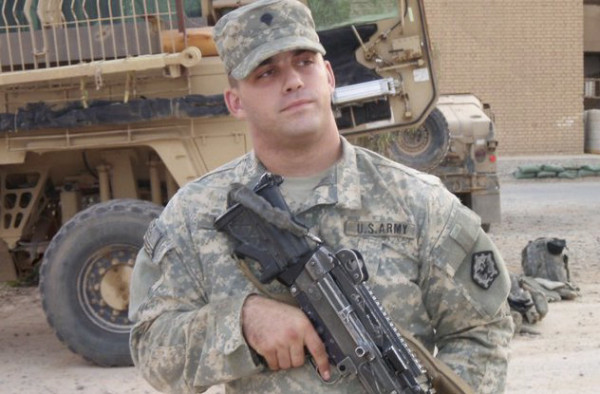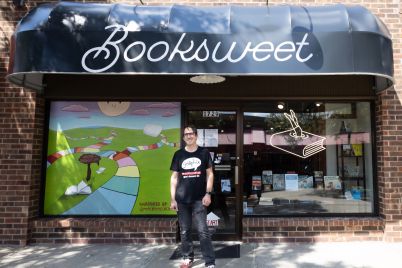
Landon Dupee, 27, was a member of the Army from 2008-2014. As a combat engineer, he had to be capable of many different jobs while on duty. COURTESY | LANDON DUPEE
BY TAYLOR MABELITINI
Contributor
Landon Dupee, 27, and a veteran of the United States Army, is self-described as “stubborn.” This stubbornness and the resilience it results in may have been what carried him through six years of service – that, and a patriotic streak:
“I joined because I felt a desire to serve my country,” Dupee said.
A current Washtenaw Community College student, Dupee spent from 2008 – 2014 both stateside and overseas in Iraq with a Military Occupational Specialty (MOS) in combat engineering, eventually earning the rank of Sergeant. He ended his service time after a debilitating knee injury, labeled in the U.S. Armed Forces as “medically separated.”
“I blew out my knee, and two surgeries later I didn’t come back like they wanted me to. Two surgeries, two years of rehab, and I still couldn’t run. They won’t do a total knee replacement because I’m too young,” Dupee said.
He said the damage done to his knee won’t be holding him back any time soon, though.
“Obviously they don’t know how stubborn I am. They’re telling me I’ll be in a wheelchair by the time I’m 50, and if they knew me, they would know I won’t care and I won’t be in a wheelchair by the time I was 50, because they told me I would be.”
For three months during his deployment in Iraq, from 2009 – 2010, Dupee and his comrades lived and worked with the local Iraqis, training them to do the job they did every day.
“That was probably the most fulfilling time in my military service. We lived on a little compound on their base…training them to do our job as good as we could,” he said.
Training was extensive, given Dupee’s MOS; as combat engineers, soldiers were required to be capable in several areas of service, all at once.
“The best way to explain it, we were jack of all trades. We had to know demolitions, we had to know mechanics…land navigation, infantry, we had to know a little of everything,” he said.
His MOS’ work with explosives is significant when it comes to how those outside the MOS – and even the army itself – perceive those within it. Dupee said that many servicemen and women, especially those who share his MOS, receive a bad reputation because of veterans like the Oklahoma City Bomber.
“He (the bomber) shared my MOS, so now coming out of the military as a combat engineer, I got put on a federal watch list for 10 years because of him,” Dupee stated.
Timothy McVeigh, a former U.S. Army soldier, detonated a truck bomb in downtown Oklahoma City in front of the Alfred P. Murrah Federal Building in April 1995, killing 168 and leaving over 600 injured. He was executed in June 2001. It was the deadliest mass killing during peacetime on American soil prior to the terrorist attacks of Sept. 11.
When it comes to the transition back to civilian life, Dupee had one word to encompass it all: challenging.
“You go from a very structured place to whatever the hell you want it to be. You can either carry the structure over from military life or you can just let it all go and try and figure it out,” Dupee said. “And with struggles with PTSD, struggles between PTSD and life – sometimes it’s not always easy, it’s not always peachy.”
According to the U.S. Department of Veteran Affairs, 7-8 percent of the U.S. population will have PTSD at some point in their lives. The mental illness is apparent four or more weeks of four types of symptoms: reliving the event, avoiding situations that remind you of the event, negative changes in feelings and beliefs, and feeling restless, jittery, or “keyed up.” PTSD can also be diagnosed in shorter amounts of time if symptoms are significantly distressing and cause a disruption in one’s everyday life.
Despite the difficulties being a veteran has brought him, Dupee is a staunch believer that not everyone who serves in the U.S. Armed Forces comes back to civilian life worse off.
“I think if anything, I want to convey that we’re not all bad. We have our problems, but we deal with them in our own ways,” Dupee said.


